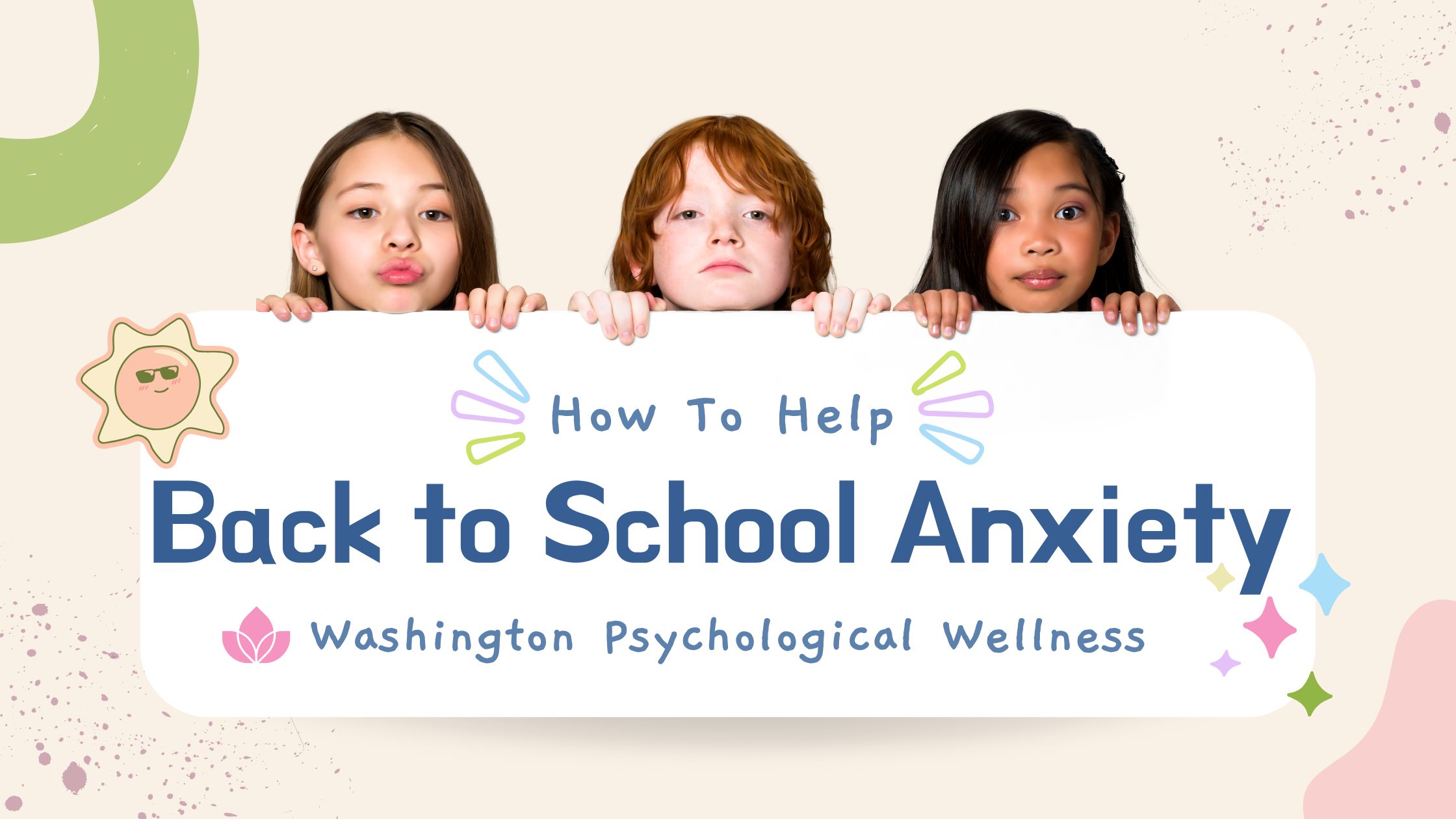
How to Help Your Child with Back-to-School Anxiety
By Washington Psychological Wellness | Therapy & Coaching in Montgomery County, with offices in Rockville, and Gaithersburg, MD
The back-to-school season can feel like an emotional rollercoaster for kids and for parents, too. While some children eagerly anticipate fresh notebooks, new teachers, and reconnecting with friends, others may experience knots in their stomach at the thought of walking into the classroom. Trouble sleeping, morning meltdowns, frequent stomachaches, or resistance to going to school are common signs of back-to-school anxiety.
As parents, it’s tough to watch your child struggle. The good news? With the right tools, you can help your child feel calmer, braver, and more confident. At Washington Psychological Wellness, we support families across Rockville, Gaithersburg, and virtually throughout Maryland to make this transition smoother.
Here are practical strategies to help your child manage back-to-school anxiety.
1. Listen First, Reassure Second
Children often feel more at ease when they know they are heard. Instead of immediately offering solutions, begin by listening carefully. You might say, “It sounds like you are worried about who you will sit with at lunch” or “I hear that you are nervous about meeting your new teacher.” These simple acknowledgments validate your child’s emotions and help normalize their experience.
2. Reinstate Predictable Routines
Children feel more secure when their daily rhythm is familiar. Begin adjusting bedtime and wake up times about two weeks before school starts. Establish consistent mealtimes and evening routines such as reading together or enjoying a calming bath. Predictability provides comfort and reduces the shock of returning to the school schedule.
3. Practice with Role Playing
Anxiety is often rooted in fear of the unknown. Practicing school scenarios at home can reduce this uncertainty. Try role playing introductions to new classmates, asking a teacher for help, or navigating the cafeteria. These rehearsals make common situations feel less intimidating and more manageable.
4. Use Visual Tools for Younger Children
For younger students, visuals can be especially effective. A daily picture schedule, a countdown calendar, or a chart celebrating successful mornings can help children know what to expect and take pride in their accomplishments.
5. Create a Comfort Plan
Equip your child with small tools they can use when anxious feelings arise. Encourage deep breathing exercises such as balloon breaths, provide a small comfort item they can keep in their pocket, or practice repeating a positive thought like “I have done this before and I can do it again.” Rehearsing these coping skills at home helps children recall them at school.
5. Model Calm Confidence
Children often reflect the emotions of their parents. Share your own excitement for the new school year and emphasize the opportunities it brings. Speak positively and show your child that you believe in their ability to succeed. Your calm and confident outlook becomes a source of reassurance for them.6. Maintain Stability at Home
While school may feel overwhelming, home can remain a safe and steady place. Maintain simple family rituals such as regular meals together, evening walks, or story time before bed. These traditions provide a sense of stability and grounding during times of change.
7. Encourage Healthy Habits
Good sleep, balanced nutrition, and physical activity strongly influence emotional wellbeing. Aim for consistent rest, encourage nutritious meals, and include daily movement. Reducing screen time before bed and offering a favorite healthy snack during the school day can also ease stress and support resilience.
8. Celebrate Efforts and Progress
Children with anxiety may doubt themselves, so focus on their efforts rather than outcomes. Celebrate small victories such as preparing for school on time, walking into the classroom, or greeting a new peer. Recognizing effort builds self confidence and helps children feel proud of their progress.9. Know When to Seek Professional Guidance
For many children, back to school nerves fade after the first few weeks. However, if your child’s anxiety lingers, disrupts sleep or eating, or leads to ongoing distress, professional support may be needed. Child and family therapists can provide evidence based strategies, help children process their emotions, and equip families with tools to manage anxiety effectively.Back to School Support in Rockville, Gaithersburg, and Online
At Washington Psychological Wellness, our compassionate team of therapists understands the unique challenges that accompany the start of a school year. We specialize in helping children build coping skills, reduce anxiety, and approach school with confidence. We are honored to serve families in Rockville, Gaithersburg, and across Maryland through secure virtual therapy sessions. Whether you choose in person care or online support, our mission is to help your child feel calmer, more confident, and ready to thrive.Let Us Help Make This School Year Brighter
If your child is struggling with back to school anxiety, you do not have to face it alone. Call 301-769-5878 or schedule a complimentary 15 minute consultation. Together, we can create a plan that empowers your child to approach the school year with confidence and resilience.
